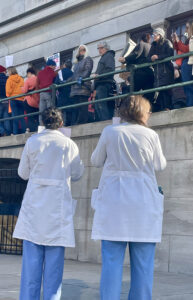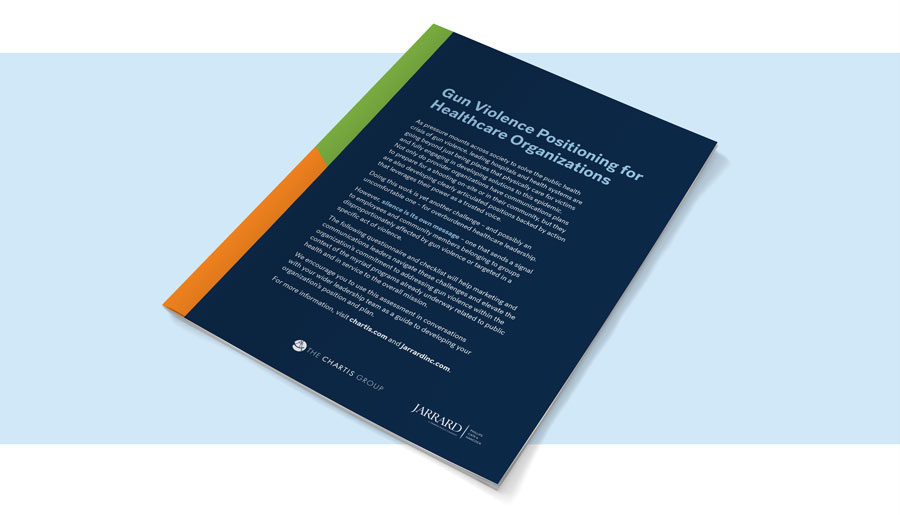By David Jarrard, Chairman, Jarrard Inc. Executive Committee
When the sun comes up tomorrow it will have been two weeks since we watched in abject horror as a mentally ill person blasted their way into The Covenant School – a few miles up the road from our Nashville office – and strolled the halls of the K-6 school, firing 152 rounds from an AR-15 and handgun.
Three children and three staff were murdered before the killer was shot dead by Nashville police.
Stop me if you’ve heard this shooter-in-a-school story before.
You have? How about the follow-up question that’s asked every damn time: When will our children stop being shot to death in their classrooms? What are we doing about it?
The tragic thing is, we know the answer, at least in part. It’s just one we don’t like.
Our children will stop being shot to death in their classrooms when we decide to do something about it. Together.
It’s the “together” piece that gets us. Literally stops us in our tracks from uniting in a common, indomitable purpose to protect the most vulnerable of us, the ones who count on us to do this very thing.
If you were newly visiting from another planet, you might be surprised to learn that even the mass murder of children, their families screaming in grief, is inadequate gravity to draw our warring political parties into the same orbit.
You might be surprised to learn that in the tragic aftermath of the Covenant shooting, the elected elders of our community and state were not gathered in a room, grinding and clashing ideas together, boiling the crazy away to distill the politically possible and ultimately drafting compromise action to save their very own children and grandchildren.
Expel black (but, not white) lawmakers for speaking “out of turn” in an emotional debate on this very issue? Can do. Take action on gun control, or funding mental health, or supporting hospitals who care for the victims? Can’t do it.
You might, then, also reasonably conclude: These are not serious people…nor are the people who gave them this power.
Traveling even the broadest middle way is too steep, it seems, as it may threaten the fundraising back home and re-election prospects. The reasonable voices in the middle are too quiet; the shouters on the wings are bully-loud. We profitably abandon statesmanship for tribal leadership.
But hope remains.

Healthcare workers participating in a gun control rally at the Tennessee State Capitol following the Covenant School shooting. Photo: Anne Hancock Toomey, Jarrard Inc. President.
Hope rests, in no small part, with you. In healthcare. In those professionals who have dedicated their lives to caring for people, supported by organizations which, in turn, serve in submission to a greater Mission, a duty of care established in an unusual contract with the community they serve.
You know the plague of gun violence better than most.
The gurneys that carry gunshot victims crash through the doors of your ERs. Mass shootings that attract the camera crews. Lonely suicides that whisper away. You see them all, along with the grieving, wrecked families that follow behind them. Every mass shooting in the US over the last many years has three common elements: mental illness, guns and hospitals, as my friend and keen healthcare observer Paul Keckley reminds us.
So, meet Dr. Ryan Mire, a Nashville primary care doc who practices 10 minutes away from Covenant. He also happens to be president of the American College of Physicians.
“There’s just no place that’s deemed to be safe,” he said the day of the Covenant massacre. “We’ve had mass shootings in every setting, from places of worship to schools to grocery stores to medical office buildings and hospitals to movie theaters.
“This is definitely in our lane as physicians because firearm injury and death is a public health crisis. Our legislators have to step up and make a difference for the sake of society. I have spent too much time with press releases on mass shootings, and we have so many big issues in healthcare that we need to fight. But we’ve had to divert our efforts to deal with something that can be preventable, and that is very frustrating.”
A public health crisis. Definitely in our lane. Very frustrating.
Driven in part by missional calling, some of the most important work on addressing gun violence is occurring beside or through our nation’s health systems. One example? It’s hard to recommend more strongly the work by Northwell Health and its establishment of its Gun Violence Prevention Center.
Gun violence, our nation’s terrible mental health crisis – the list goes on – are each overwhelming, each important. And the solutions for each extend well beyond the bounds of our traditional healthcare delivery model.
As Dr. Mire says, healthcare has many (many) big issues that must be addressed, not the least of which is assuring the continued viability of the organizations that provide this care.
But, nonetheless, here healthcare stands, doing what’s doable when others can’t. Or won’t.
The hope healthcare offers is not only its continuing, stable, lights-always-burning presence of care, though that is a great source of it. Never underestimate that your organization, its unlocked front door and bustling interiors, is a symbol of sanctuary and hope.
Healthcare offers something more that’s relevant to this conversation: It demonstrates to others how they, too, can do hard things, the common-sense practical things that must be done, if they give themselves to a larger purpose and become the serious people desperately needed now.
It’s a model for how others – including guarded and fearful policy makers – can serve the very community with whom they are entrusted today.
Here’s the great challenge that you already know: Healthcare’s hopeful example and great need in the midst of this mass shooting mess won’t be passively discovered. Instead, it’s a story that must be told, loudly and insistently, by us. In a public health crisis, the community’s healthcare leaders must speak.
Yes, this storytelling is fraught with risk. The people who must be moved to action are the very people who hold our purse strings. This is not a call to out-shout the crowd, but to actively and persuasively join the conversation with the powerful story only healthcare can tell, with the living example only healthcare can offer.
These words appear on Easter Sunday, a day when Christians celebrate the resurrection of Jesus and the call to be co-creators of a new and better world. It’s Spring, too, when everyone sees new life colorfully surge from the ground, even after the harshest winter.
Hope blossoms with action. That is the work ahead.
Today, two weeks later, in thorny grief and boiling frustration, we remain stubbornly purposeful, deeply grateful…and always hopeful.
Use Your Voice
Access a set of free resources on gun violence created by Jarrard Inc. for health systems and provider organizations whose leaders are working to clearly articulate their position, leverage their trusted voice and ignite action. Take them, use them, share them.




